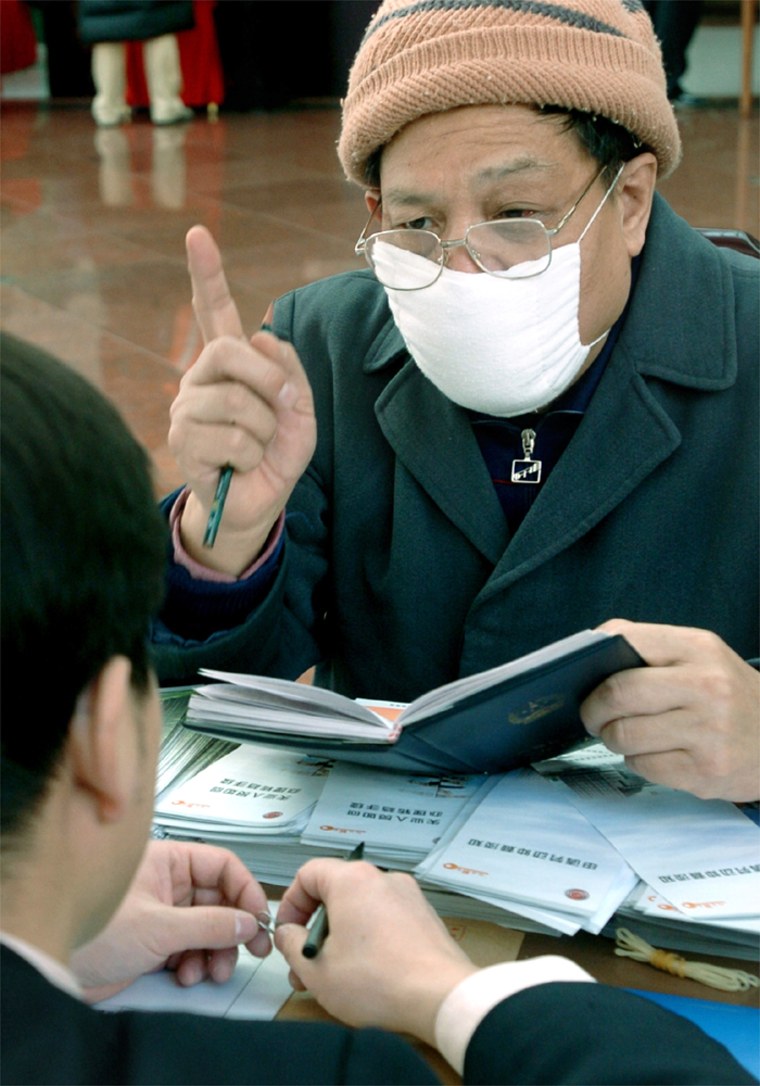China cleared a sick businessman of having SARS, while the World Health Organization warned Tuesday that the country’s health-care system could be overloaded if everyone with cold or flu symptoms were treated as a potential SARS case.
The businessman was hospitalized in the southern city of Shenzhen with a fever and cough, and some news reports cited him as China’s fourth suspected SARS case of the season.
But the man has been found to have bacterial pneumonia, the official Xinhua News Agency and newspapers reported, citing the head of the city’s health bureau, Zhou Jun’an.
Chinese authorities say they have one confirmed and two suspected SARS cases, all of them in Guangzhou, the capital of Guangdong province, which includes Shenzhen. Shenzhen borders Hong Kong, which is screening people crossing the border in hopes of keeping out the flu-like disease.
The confirmed SARS patient was released from a hospital last week after being pronounced recovered, while the two suspected cases still were being treated.
WHO urges caution
WHO spokesman Bob Dietz said China must take care to screen out cases of cold and flu before committing the huge resources needed to isolate and treat a SARS patient.
“No one wants to overdiagnose, which is just as dangerous as underdiagnosing in terms of overloading the health care system,” Dietz said in Beijing.
“You can’t just willy-nilly isolate everybody who walks into a hospital because they have a fever. First you have to exclude ... the possibility of other diseases before treating them as SARS cases.”
Severe acute respiratory syndrome emerged in Guangdong in late 2002 and sickened more than 8,000 people worldwide before subsiding in June. The disease killed 774 people.
Authorities have launched an emergency effort to prevent a new outbreak of the disease, ordering the slaughter of thousands of animals seized from markets and launching a campaign to exterminate rats to eliminate possible sources of disease.
China’s strictness in defining SARS cases led to confusion earlier when officials first denied that a waitress in Guangzhou had tested positive for the disease and later announced that she was the country’s second suspected case.
Beijing’s policy is to report only cases that are verified by experts as “suspected SARS,” said Health Ministry spokesman Mao Qun’an, quoted Tuesday by the official China Daily newspaper.
“The Ministry of Health has not received any report about the case in Shenzhen. But it would not be surprising that some people are revealed by nonofficial channels as suspected SARS cases in the coming days.”
A Shenzhen Health Bureau spokeswoman also denied Tuesday what she said were rumors of other possible SARS cases in the city.
No indication of link to animals
WHO also cautioned against declaring prematurely that rats could be the source of the virus.
Health experts are looking into whether the first SARS case in Guangzhou, a television producer, might have been exposed to the virus by rats. The second suspected case, a waitress, worked in a restaurant that served wild game.
While some tests have linked rats to the virus, “I wouldn’t lend any credence to those results,” said Jeffrey Gilbert, an animal diseases expert with a WHO team visiting Guangzhou.
“I think they’re basically fraught with problems,” he said by telephone from Guangzhou, calling the results “a false positive.”
Gilbert also cautioned against reading too much into tests that have found genetic similarities between a virus found in civet cats — another suspected SARS culprit — and the SARS virus.
Researchers have not isolated a complete SARS coronavirus from the animals, but only “gene fragments,” he said. Those fragments “are not an indication of a link, they’re an indication of a similar virus.”
